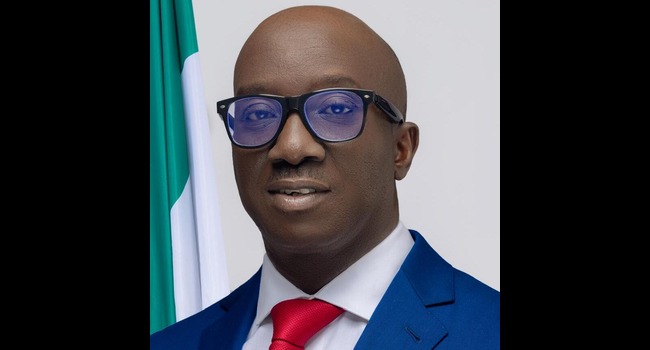Governor Monday Okpebholo of Edo State has restored the full statutory rights of the Oba of Benin, Omo N’Oba N’Edo Uku Akpolokpolo, Oba Ewuare II.
This decision reverses contentious policies by the previous administration and strengthens the government’s commitment to respecting Benin’s rich cultural heritage.
The move resolves disputes over the ownership of ancient Benin artefacts looted during the 1897 British invasion of the Benin Kingdom.
Governor Okpebholo also ordered the withdrawal of a letter issued by the former administration that repurposed the Oba Akenzua II Cultural Centre as a motor park.
“The Cultural Centre will now serve its original purpose,” the Governor announced.
He described the restoration as part of efforts to foster harmonious relations between the government and the people.
Benin Artefacts Returned to Their Rightful Custodian
The Federal Government recently recognized the Oba of Benin as the rightful owner and custodian of the repatriated artefacts.
This was formalized in Government Notice No. 25, published in the Federal Republic of Nigeria Official Gazette No. 57, Volume 110.
Governor Okpebholo pledged his administration’s support for the Federal Government’s decision.
“The Oba of Benin, as the father of all Benin people, is the sole custodian of their customs and traditions,” Okpebholo declared.
He emphasized that the Oba’s role as the custodian of the artefacts aligns with Benin’s cultural values.
Okpebholo distanced his administration from the Museum of West Africa Art (MOWA), which the previous government had supported as a home for the returned artefacts.
Instead, the state will back the construction of the Benin Royal Museum, initially planned to house the treasures.
Traditional Councils and Financial Entitlements Restored
Governor Okpebholo abolished the new traditional councils in Edo South created by the last administration.
He directed that the status quo be maintained, recognizing the Benin Traditional Council (BTC) as the sole legitimate body.
The Governor also restored the statutory financial entitlements of the BTC.
“Restoring these entitlements is a step toward respecting the customs and traditions of the Benin people,” he stated.
Cultural Restoration and Mutual Respect
Governor Okpebholo reaffirmed his administration’s respect for the Oba of Benin and traditional institutions.
“Our government will not interfere in the internal affairs of the Benin Traditional Council,” the Governor promised.
He stressed that the Oba’s rights and privileges would be upheld, saying, “The statutory rights of the Monarch are fully restored, and my administration will ensure they remain protected.”
A New Chapter for Edo State
The restoration comes as part of broader efforts by the Okpebholo administration to heal divisions caused by the former government’s policies.
By recognizing the Oba’s authority and ownership of the artefacts, the Governor hopes to unite the people of Edo State.
“This is about preserving our cultural heritage and ensuring that history is not rewritten or tampered with,” he said.
Benin Artefacts and the 1897 Massacre
The artefacts, looted during the 1897 Benin Massacre, are central to Benin history and culture.
British colonial forces raided the Oba’s palace and seized these treasures, dispersing them to museums and collectors worldwide.
In recent years, international efforts have led to the return of many of these items to Nigeria.
The decision to place the artefacts under the Oba of Benin’s custody reaffirms their cultural and historical significance.
Oba of Benin Speaks on Restoration
While the Oba of Benin has yet to release an official statement, many believe the Monarch supports the move.
“This restoration is a victory for tradition and the Benin people,” a palace insider said.
Public Reaction to the Governor’s Decision
The Governor’s announcement has drawn praise from Benin indigenes and cultural advocates.
“Governor Okpebholo has done the right thing by respecting our traditions,” a community leader said.
Others see the decision as a way to correct past injustices.
“This is a step toward cultural reconciliation and progress,” said a university lecturer in Benin history.

